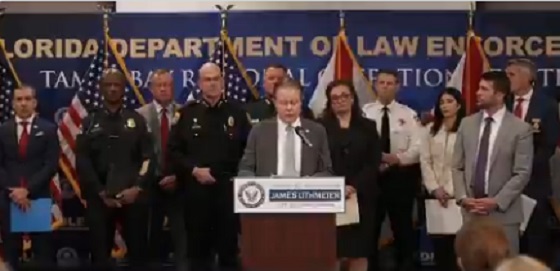Crime
Saskatchewan RCMP Major Crimes seeks information about death of Red Deer, AB woman

From Saskatchewan RCMP
In February 2021, Watrous RCMP received a report of human remains located in the RM of Morris, SK. Saskatchewan RCMP Major Crimes took carriage of the investigation. Background is available here: https://www.rcmp-grc.gc.ca/en/news/2021/rcmp-major-crime-unit-south-human-remains-located-watrous-detachment-area.
Since then, Major Crimes has been working to identify the remains, in conjunction with Watrous RCMP, Saskatchewan RCMP’s Forensic Identification Services, Police Dog Services, the Saskatchewan Coroners Service and a forensic anthropologist.
In March 2022, investigators enlisted the assistance of a forensic genealogy firm. Using DNA, the experts were able to determine the deceased individual had closely-related relatives in the Red Deer, AB area.
Further investigation by Major Crimes determined the remains likely belonged to a woman from Red Deer, who was last seen there in January 2021. She had not been reported missing to police. In January 2023, Saskatchewan RCMP Forensic Identification Services conclusively determined the human remains belong to Kassandra Jorquera, who would have been 27 years old at the time of her death. Her family has been notified.
Major Crimes continues to investigate the circumstances of Kassandra’s death, which investigators have determined is suspicious in nature.
Investigators want to speak with anyone who has information about Kassandra’s death, or has knowledge of her activities in and around January 2021. Kassandra often frequented Red Deer and is known to have been there in January 2021. She also visited Grande Prairie periodically. Her connection to Saskatchewan is unknown at this time.
Investigators are releasing her photo and description to help advance this investigation. Kassandra was approximately 5’5” and 110 lbs. She had shoulder-length dark brown hair and brown eyes. Her family describes her as having “beautiful” teeth.
“Since February 2021, we’ve worked diligently to identify the person located deceased. We now know it’s Kassandra. Our work continues: we need to retrace all of her steps in January 2021,” says Sgt. Ryan Boogaard from Saskatchewan RCMP Major Crimes. “I know it was some time ago, but we’re asking people – particularly in the Red Deer area – to take a look at her picture and think back. Did you know Kassandra? Did you speak with her or encounter her in the weeks after New Year’s 2021? You may have a piece of the puzzle that will help us determine what happened to her in those final weeks of her life.”
Anyone with information on Kassandra’s death, or whereabouts in and around January 2021, should contact Saskatchewan RCMP Major Crimes at 639-625-4535. Information can also be submitted anonymously by contacting Saskatchewan Crime Stoppers at 1-800-222-TIPS (8477) or www.saskcrimestoppers.com.
Crime
Suspected ambush leaves two firefighters dead in Idaho

Quick Hit:
Two firefighters were killed and another wounded Sunday after a gunman opened fire on first responders tackling a blaze near Coeur d’Alene, Idaho. The shooter was later found dead, and authorities believe the fire may have been set to lure crews into an ambush.
Key Details:
- The ambush began around 2 p.m. local time as fire crews arrived at a brush fire and were met with sniper-style gunfire from a wooded area.
- SWAT teams located the deceased suspect roughly five hours later, with a weapon nearby. His identity has not yet been released.
- The Kootenai County Sheriff said the ongoing fire could not be addressed during the gunfight, calling the attack a “heinous direct assault” on first responders.
Diving Deeper:
A deadly ambush on Sunday afternoon left two Idaho firefighters dead and a third injured after they were shot while attempting to contain a brush fire on Canfield Mountain. The surprise attack reportedly began around 2 p.m., when bullets suddenly rained down on emergency crews from hidden positions in the wooded terrain near Coeur d’Alene.
Authorities now believe the blaze may have been deliberately set as bait. Kootenai County Sheriff Bob Norris described the situation as “an active sniper attack,” saying the scene quickly escalated into chaos with gunfire coming from multiple directions.
“We don’t know if there’s one, two, three or four [shooters],” Norris said in an early evening press conference. “I’m hoping that someone has a clear shot and is able to neutralize [the suspect], because they’re not showing any signs of surrendering.”
Roughly five hours after the first shots were fired, SWAT officers found a body next to a firearm along the Canfield Mountain Trail. Authorities have not confirmed whether the individual was the sole assailant, nor have they publicly identified the person. The FBI, along with state and local agencies, had been deployed to the scene to assist with the operation.
The two firefighters who died have not yet been named. The third, who sustained a gunshot wound, was transported to Kootenai Health and remains hospitalized. His current condition is unknown.
The firefight effectively halted efforts to contain the brush fire, which remained active late into Sunday. “It’s going to keep burning. We can’t put any resources on it right now,” Norris said during the standoff. Shelter-in-place orders were issued for the surrounding area, including the popular Canfield Mountain Trailhead, but those restrictions were lifted after the suspect was found dead.
Idaho Governor Brad Little reacted to the tragedy on social media, calling the ambush “a heinous direct assault on our brave firefighters.” He added, “Teresa and I are heartbroken. I ask all Idahoans to pray for them and their families as we wait to learn more.”
Federal and local officials are continuing to investigate the incident, including the origins of the fire and whether additional suspects may have been involved.
Crime
Florida rescues 60 missing kids in nation’s largest-ever operation

Quick Hit:
Florida authorities have recovered 60 “critically missing” children in a two-week operation across the Tampa Bay area. The joint state and federal effort, dubbed Operation Dragon Eye, led to eight arrests and uncovered new human trafficking investigations.
Key Details:
-
The children, aged 9 to 17, were found across Hillsborough, Pinellas, and Pasco counties. The operation was carried out with help from the U.S. Marshals, state prosecutors, and local police departments.
-
Florida Attorney General James Uthmeier confirmed eight individuals were arrested on charges including human trafficking, child endangerment, and drug-related offenses. Additional investigations are underway.
-
The Florida Department of Law Enforcement (FDLE) hailed the operation as the most successful child recovery effort in U.S. history, declaring, “Florida doesn’t look the other way — we hunt predators and bring kids home.”
🚨 MAJOR BREAKING: U.S. Marshals and Florida officials announce LARGEST single child rescue operation in American history.
Over 2 weeks, 60 KIDS are safe, in custody.
This involved over 20 agencies and 100+ people. 8 people were arrested, charged with human trafficking, child… pic.twitter.com/trkcFMhtmX
— Eric Daugherty (@EricLDaugh) June 23, 2025
Diving Deeper:
Over a two-week span, law enforcement agencies across Florida joined forces for what’s being called a historic child recovery mission. Dubbed Operation Dragon Eye, the coordinated effort led to the rescue of 60 critically missing children—some as young as 9 years old—in the Tampa Bay region, including Hillsborough, Pinellas, and Pasco counties.
According to Fox 13, federal and state agencies worked alongside local law enforcement, with direct involvement from the U.S. Marshals Service and Florida prosecutors. The term “critically missing,” as defined by the Marshals Service, applies to minors facing heightened threats such as exposure to violent crime, sexual exploitation, substance abuse, or domestic violence.
Florida Attorney General James Uthmeier praised the operation’s success in a statement posted to social media Monday. “We will keep fighting evil head-on and bringing accountability to those who harm children,” he said, confirming eight suspects had been taken into custody, with additional investigations now underway related to human trafficking networks.
Charges filed against the arrested individuals include human trafficking, child endangerment, custodial interference, and drug possession.
The Florida Department of Law Enforcement described the effort as “the most successful missing child recovery operation in American history.” In a statement, the agency said its analysts and field agents “were proud to stand shoulder to shoulder with the U.S. Marshals” and emphasized that “Florida doesn’t look the other way.”
Several nonprofits and local support groups played a vital role in caring for the recovered children, including More Too Life, the Children’s Home Network, Bridging Freedom, Bridges of Hope, Family Support Services of Pasco and Pinellas, and Redefining Refuge.
Dr. Katherine Gomez of the Florida Department of Juvenile Justice said many of these children had felt hopeless and alone. “Oftentimes these young people have felt like there’s no one in their corner. They feel abandoned… like they have to look out for themselves because no one else will,” she told WFLA.
FDLE Commissioner Mark Glass acknowledged the emotional toll such operations take on officers, who are exposed to the trauma these children endure. “They have to see everything that happens to these children, and we need to pray for them because they had to take that burden home,” he said.
Glass added that while the operation struck a major blow to human trafficking in the region, the threat remains. “The fight isn’t over.”
U.S. Marshal Bill Berger of the Middle District of Florida warned that traffickers often return to their victims if not apprehended. “If the offenders are not apprehended, they will reconnect with these children. They are, in my opinion, leeches,” Berger stated.
Officials vowed continued vigilance to keep predators behind bars and ensure every vulnerable child is found and protected.
-

 Brownstone Institute2 days ago
Brownstone Institute2 days agoFDA Exposed: Hundreds of Drugs Approved without Proof They Work
-

 Energy1 day ago
Energy1 day agoChina undermining American energy independence, report says
-

 Business1 day ago
Business1 day agoEurope backs off greenwashing rules — Canada should take note
-

 Automotive1 day ago
Automotive1 day agoPower Struggle: Electric vehicles and reality
-

 Business1 day ago
Business1 day agoTrump on Canada tariff deadline: ‘We can do whatever we want’
-

 Automotive1 day ago
Automotive1 day agoElectric vehicle sales are falling hard in BC, and it is time to recognize reality.
-

 Business9 hours ago
Business9 hours agoCanada Caves: Carney ditches digital services tax after criticism from Trump
-

 Crime9 hours ago
Crime9 hours agoSuspected ambush leaves two firefighters dead in Idaho






